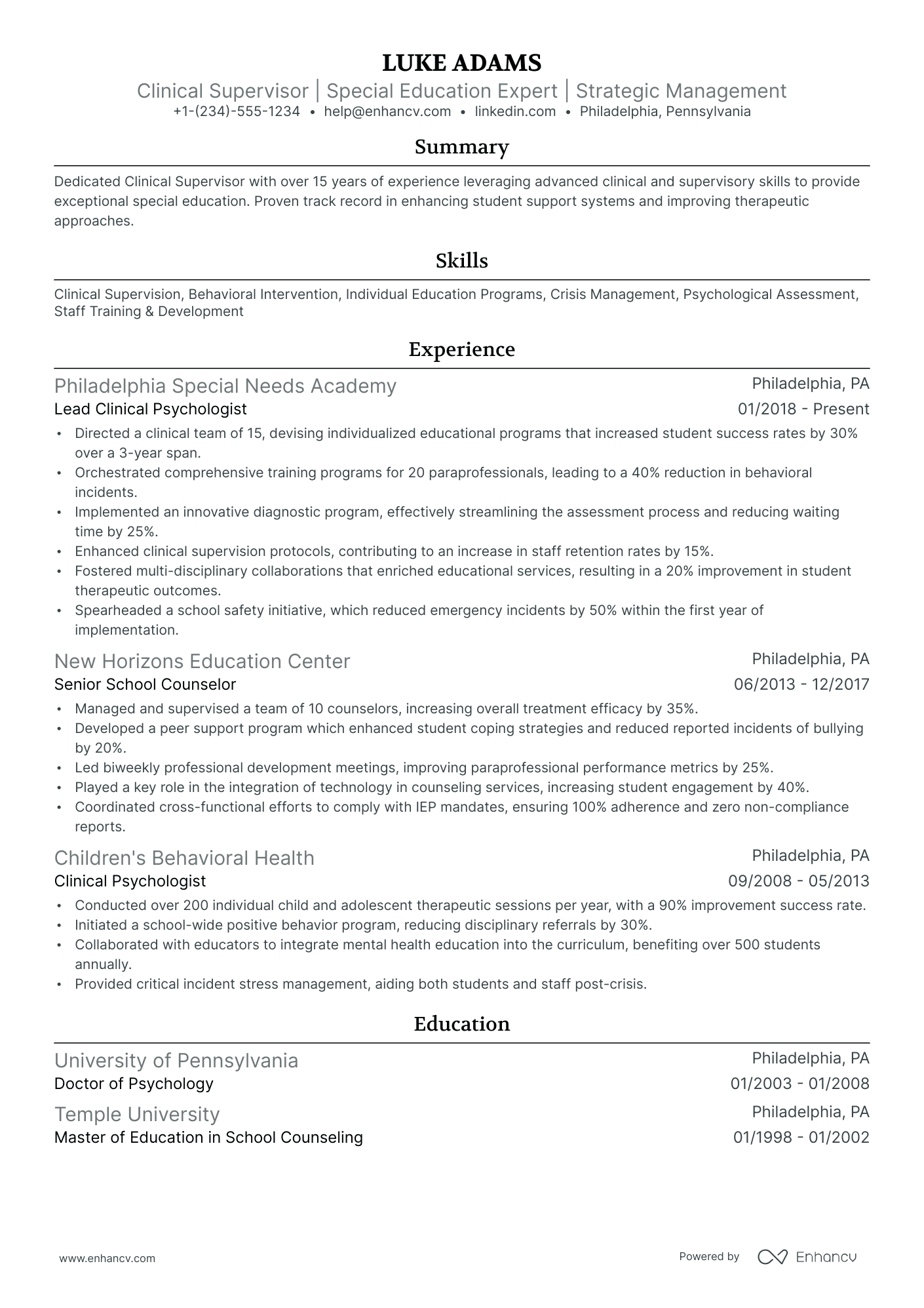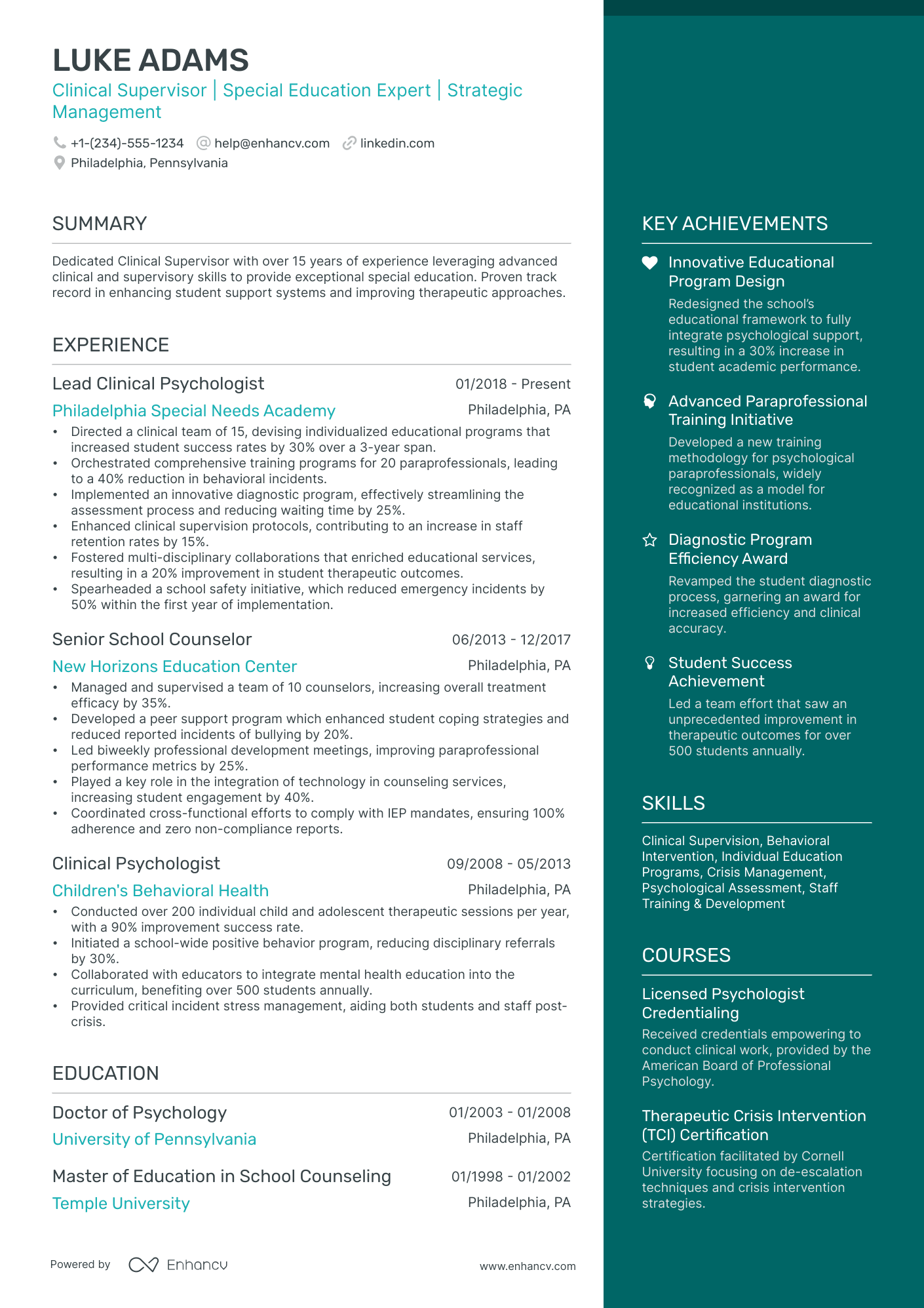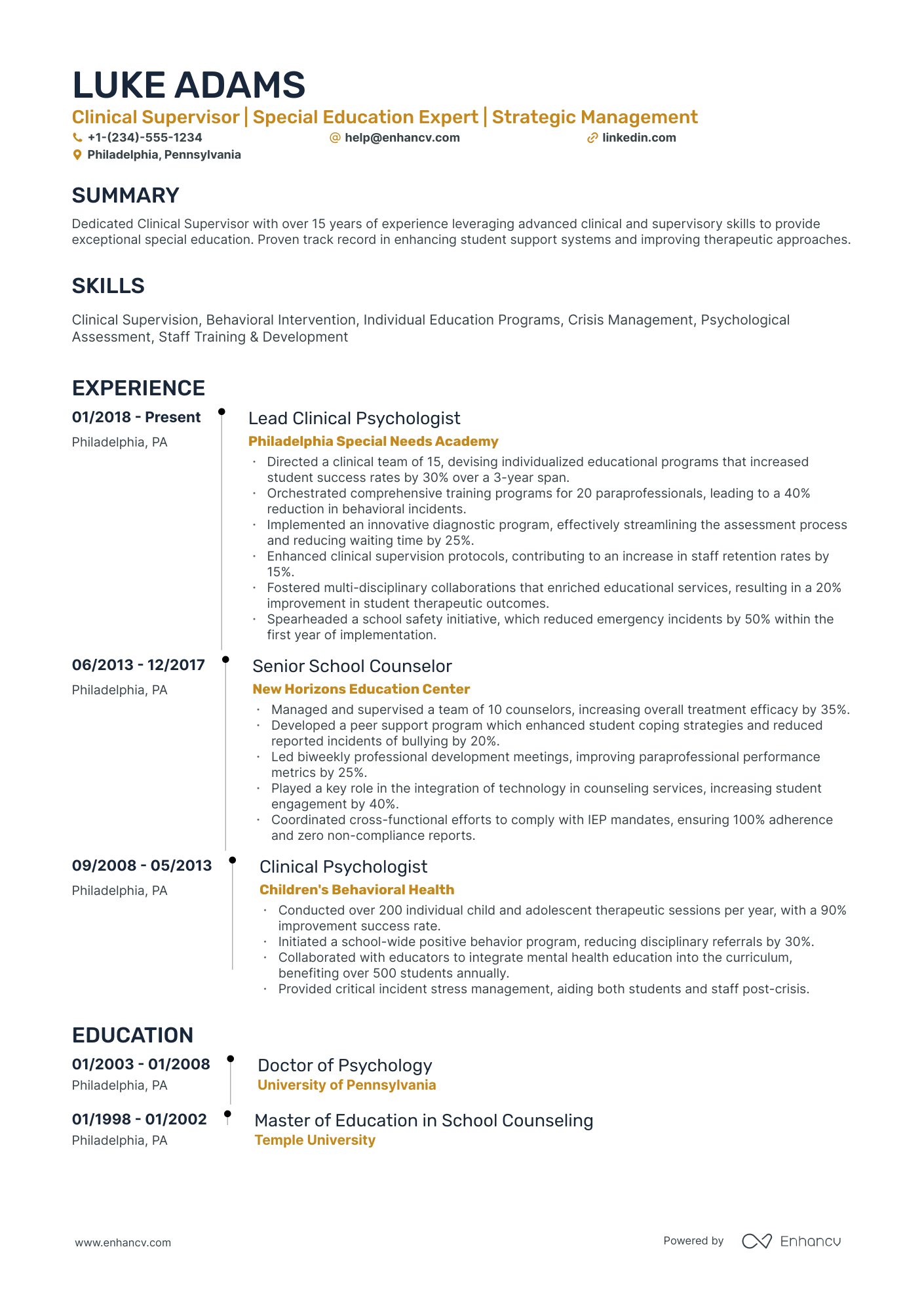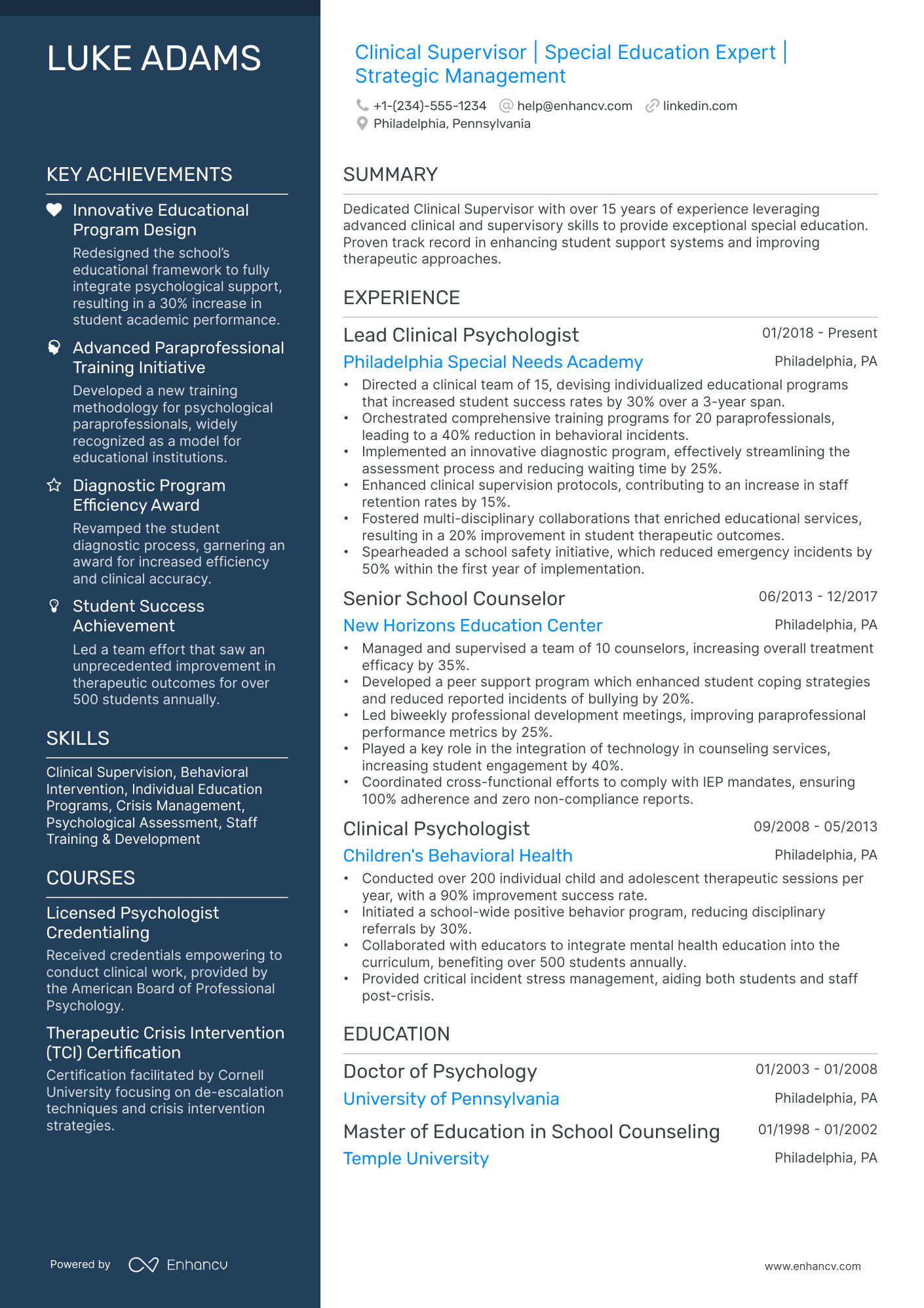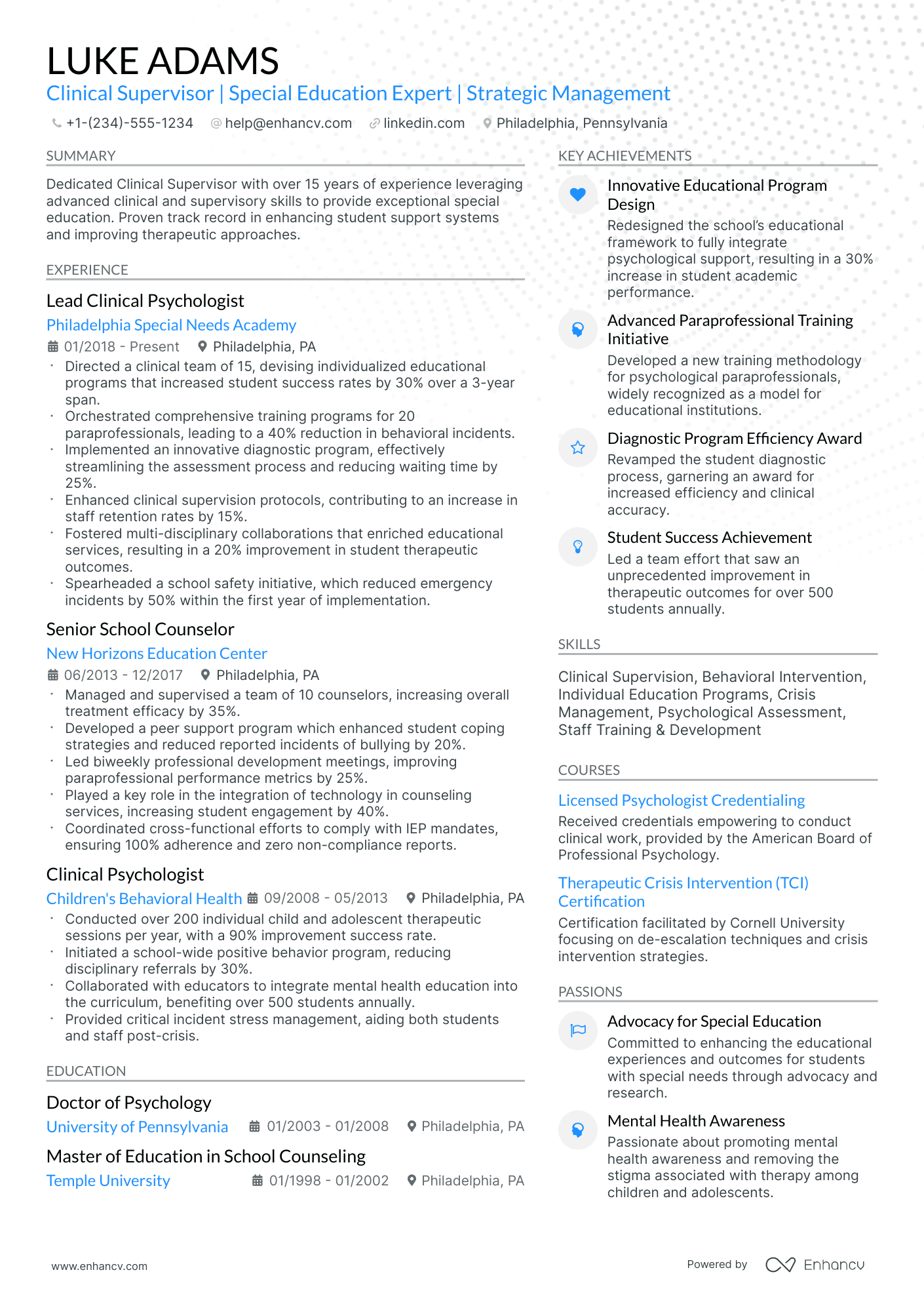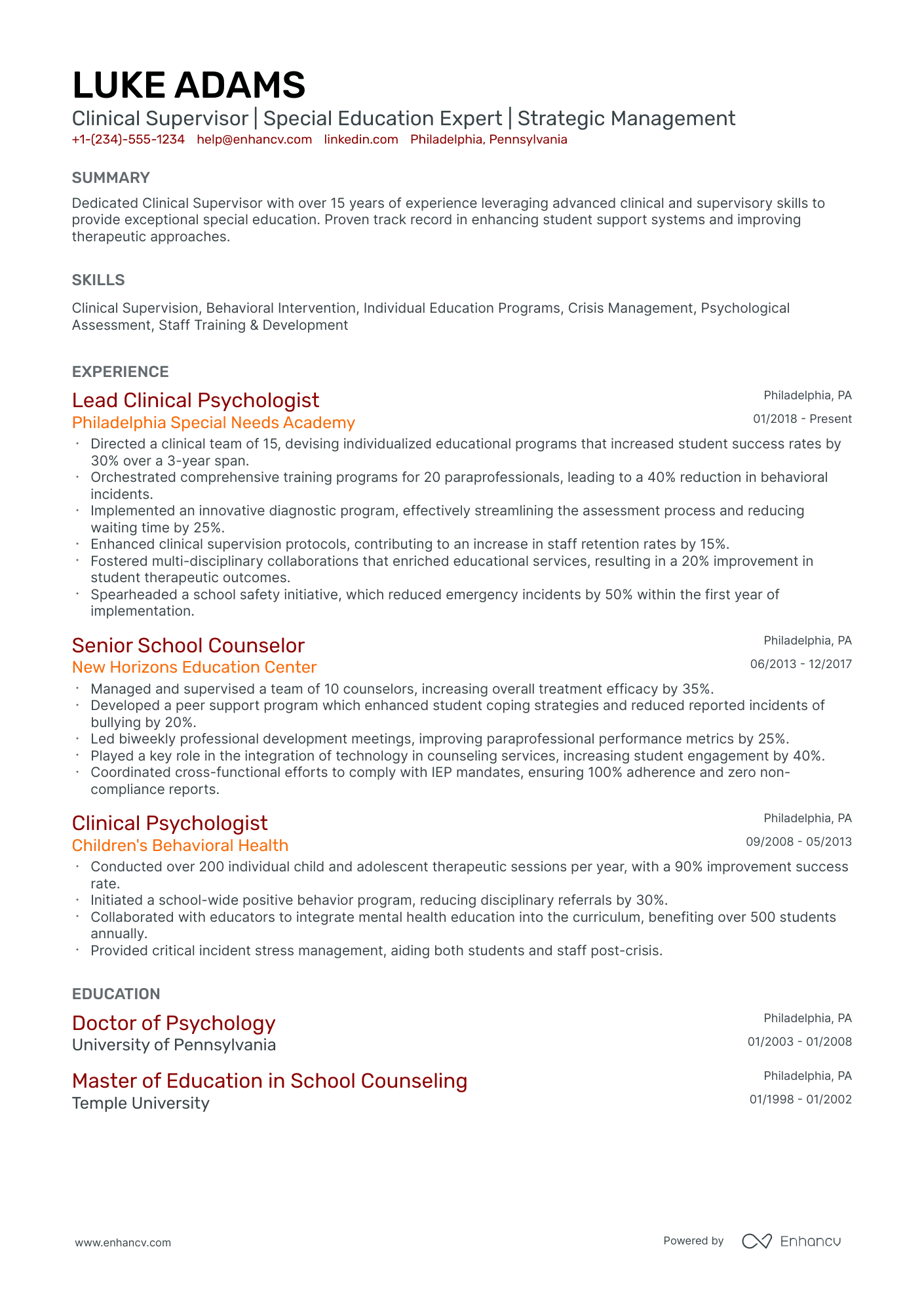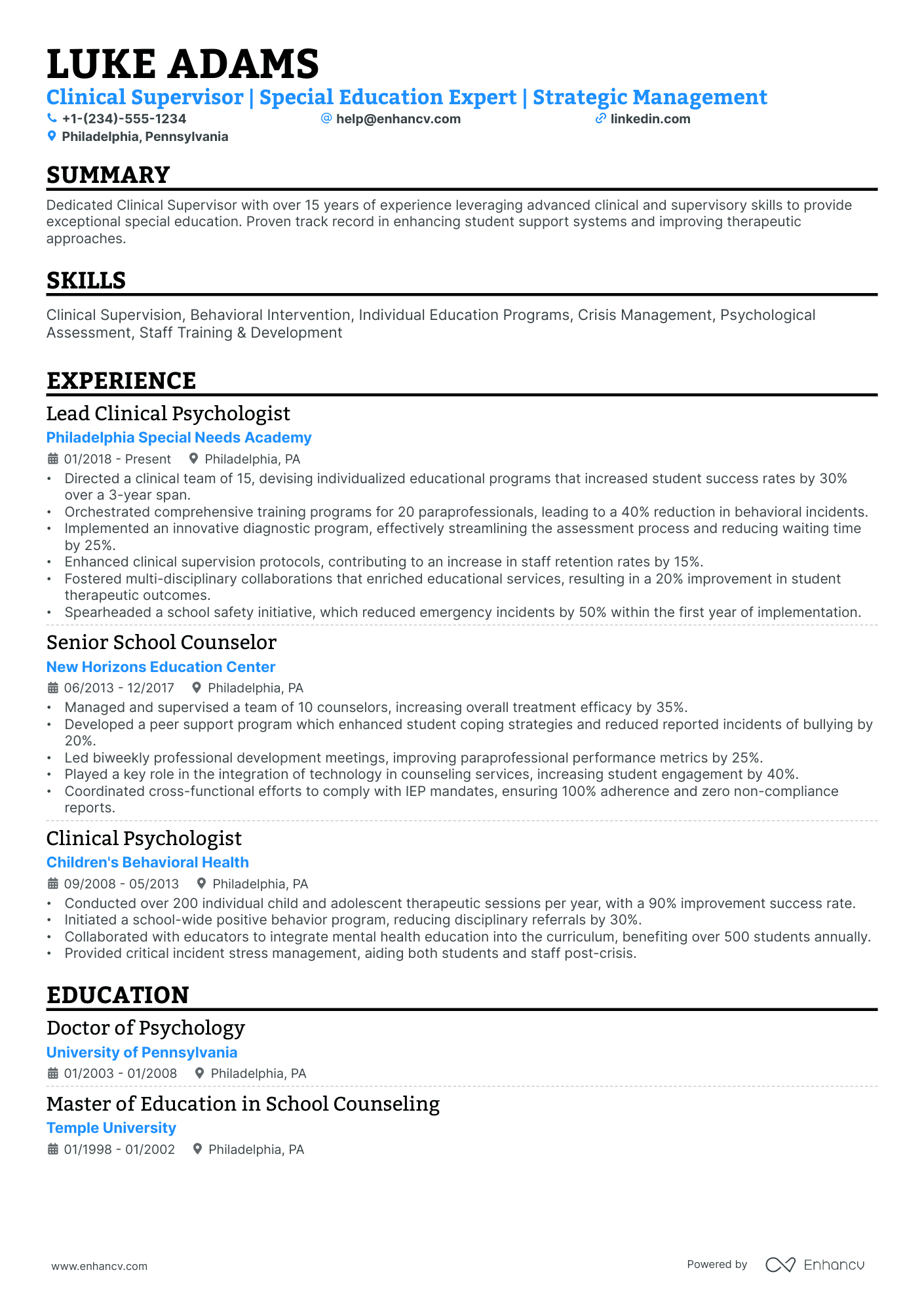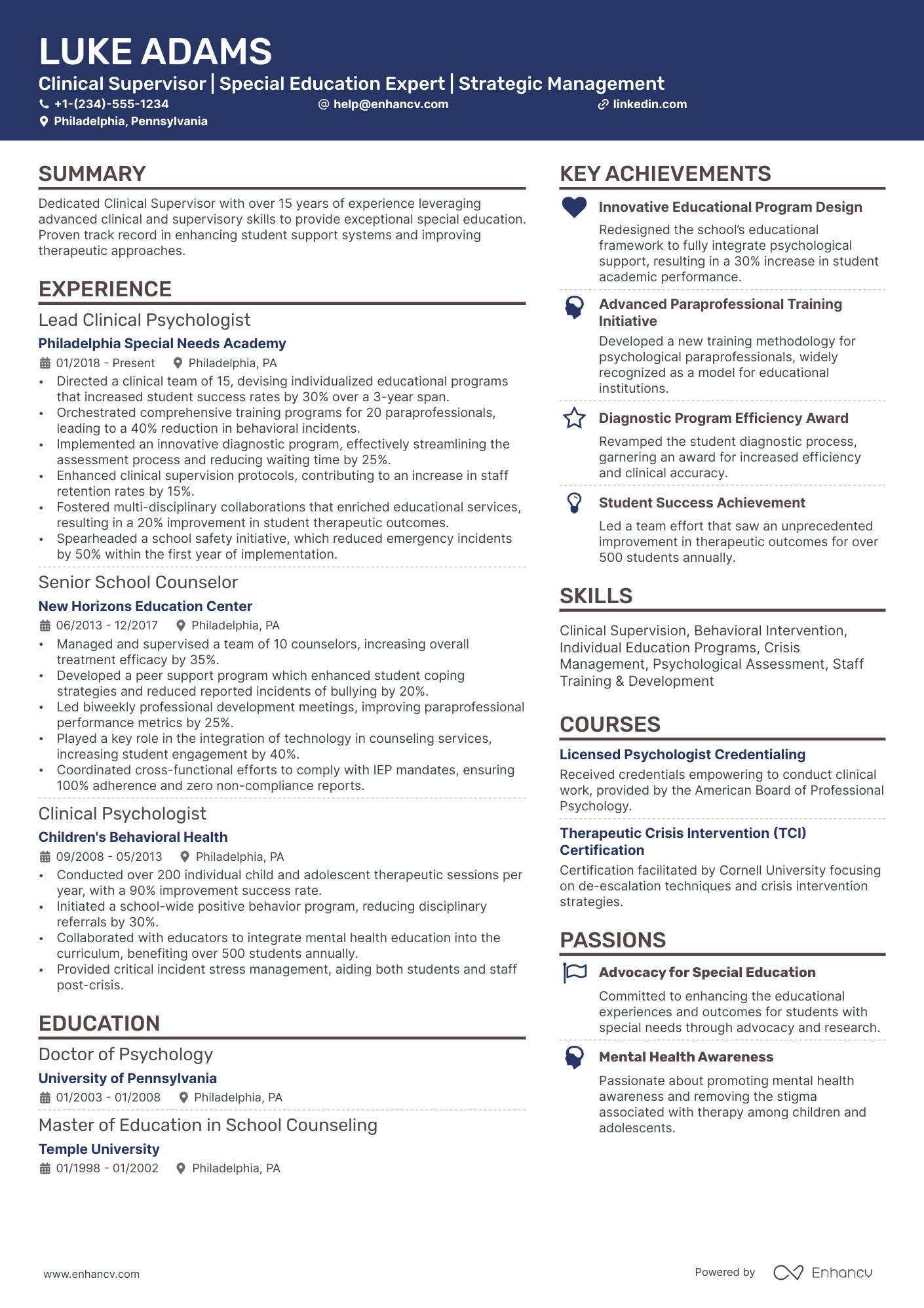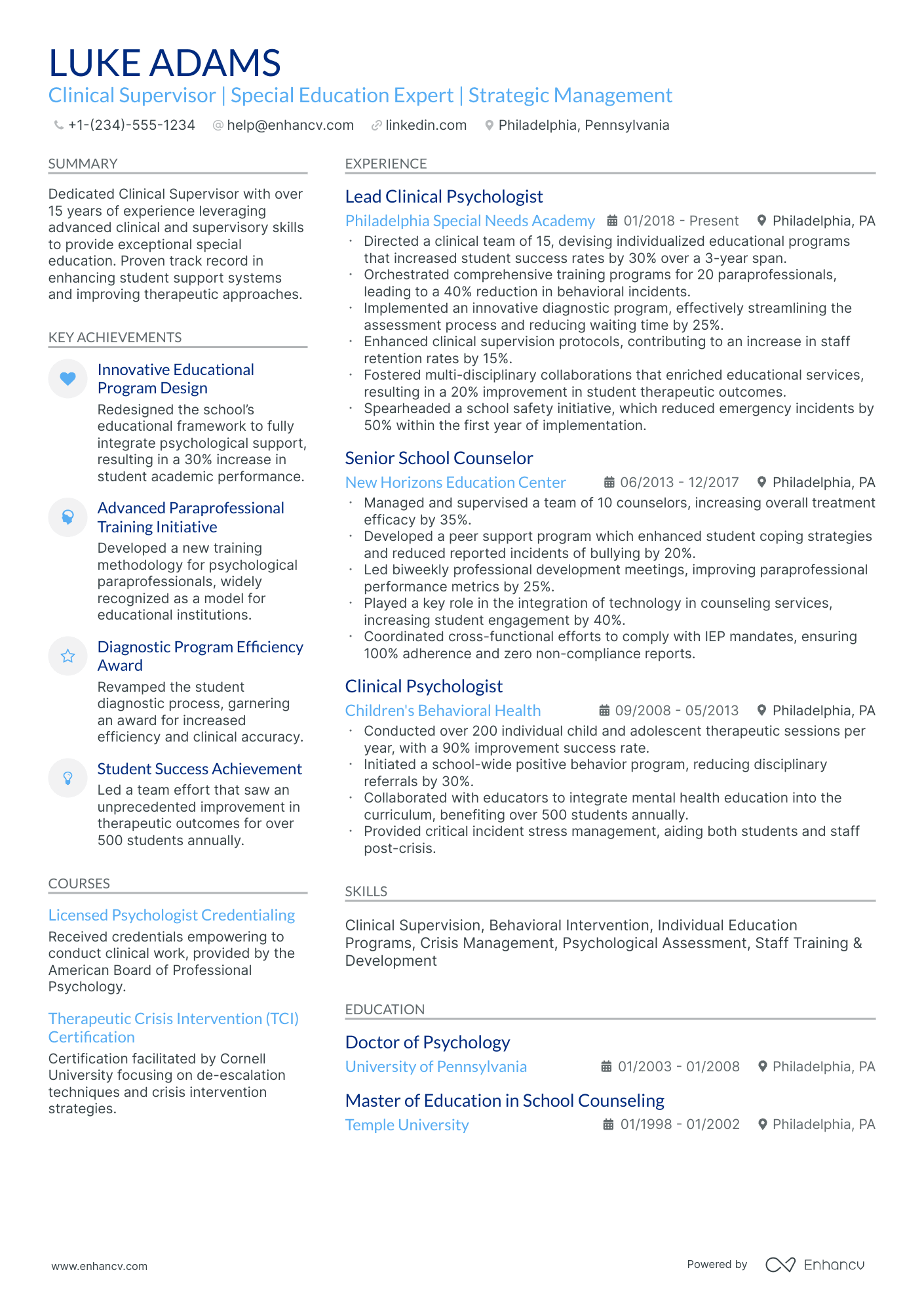Most clinical director resumes fail because they read like job descriptions and bury leadership impact under tasks and systems. In today's fast screening, your clinical director resume must pass applicant tracking system filters and win recruiter scans in a crowded field.
A strong resume shows what you improved and what changed because of you. Knowing how to make your resume stand out is essential—you should highlight outcomes like reduced readmissions, improved patient satisfaction scores, expanded service lines, increased staff retention, managed multi-site budgets, and strengthened compliance audit results.
Key takeaways
- Quantify clinical outcomes, compliance results, and budget impact in every experience bullet.
- Use reverse-chronological format to showcase progressive leadership scope and decision ownership.
- Tailor resume language to mirror the job posting's frameworks, software, and compliance standards.
- Anchor each skill claim to a measurable result in your summary or experience section.
- Avoid hybrid or functional formats for senior roles—they obscure career progression and raise concerns.
- Place certifications above education when they're recent or central to the target role.
- Use Enhancv's tools to tighten bullet points and align your resume with specific job descriptions.
Job market snapshot for clinical directors
We analyzed 273 recent clinical director job ads across major US job boards. These numbers help you understand regional hotspots, employer expectations, employment type trends at a glance.
What level of experience employers are looking for clinical directors
| Years of Experience | Percentage found in job ads |
|---|---|
| 1–2 years | 9.9% (27) |
| 3–4 years | 7.7% (21) |
| 5–6 years | 7.7% (21) |
| 7–8 years | 0.4% (1) |
| 10+ years | 1.8% (5) |
| Not specified | 72.5% (198) |
Clinical director ads by area of specialization (industry)
| Industry (Area) | Percentage found in job ads |
|---|---|
| Healthcare | 49.8% (136) |
| Finance & Banking | 38.5% (105) |
| Government | 5.5% (15) |
| Education | 4.8% (13) |
Top companies hiring clinical directors
| Company | Percentage found in job ads |
|---|---|
| Upstream Rehabilitation Inc. | 13.6% (37) |
| Ivy Rehab | 7.0% (19) |
| United Surgical Partners International | 7.0% (19) |
| UnitedHealth Group Inc. | 6.6% (18) |
| ATI Physical Therapy | 5.5% (15) |
| U.S. Physical Therapy | 5.1% (14) |
| Department of Veterans Affairs | 3.7% (10) |
Role overview stats
These tables show the most common responsibilities and employment types for clinical director roles. Use them to align your resume with what employers expect and to understand how the role is structured across the market.
Day-to-day activities and top responsibilities for a clinical director
| Responsibility | Percentage found in job ads |
|---|---|
| Physical therapy | 16.1% (44) |
| Leadership | 10.3% (28) |
| Patient care | 8.8% (24) |
| Cpr certification | 7.0% (19) |
| Emr | 7.0% (19) |
| Applied behavior analysis | 6.2% (17) |
| Clinical supervision | 5.9% (16) |
| Nursing | 5.9% (16) |
| Communication | 5.1% (14) |
| Budgeting | 4.4% (12) |
| Marketing | 4.4% (12) |
| Microsoft office | 4.0% (11) |
How to format a clinical director resume
Recruiters evaluating clinical director candidates prioritize evidence of progressive leadership, operational oversight, and measurable improvements in patient outcomes or program performance. A well-chosen resume format ensures these signals—scope of accountability, decision ownership, and clinical governance experience—are immediately visible rather than buried or fragmented.
I have significant experience in this role—which format should I use?
Use a reverse-chronological format—it's the strongest choice for a clinical director resume because it puts your leadership trajectory and expanding scope front and center. Do:
- Lead each role entry with your span of control: team size, number of programs or facilities managed, and budget authority.
- Highlight domain-specific expertise such as regulatory compliance (Joint Commission, CMS), electronic health record systems (Epic, Cerner), and clinical quality frameworks.
- Quantify business and patient outcomes tied directly to decisions you owned.
Why hybrid and functional resumes don't work for senior roles
Hybrid formats fragment your leadership narrative by pulling key achievements out of their organizational context, making it harder for reviewers to assess the scope and duration of your accountability at each stage. Functional formats are even more problematic—they obscure career progression entirely, which strips away the evidence of increasing decision ownership and clinical governance responsibility that hiring committees expect from a director-level candidate. Avoid both formats entirely when applying for clinical director or equivalent senior positions, as they raise questions about gaps, demotions, or inflated scope that a straightforward chronological record would resolve.
- A functional format may be acceptable only if you're transitioning into clinical leadership from a closely related role (e.g., nurse manager or program coordinator) with limited director-level titles, and only when every listed skill is anchored to a specific project, outcome, or measurable contribution.
Once your layout and formatting choices are in place, the next step is determining which sections to include so each one reinforces your qualifications effectively.
What sections should go on a clinical director resume
Recruiters expect a clinical director resume to show leadership in patient care, operational oversight, and measurable improvements in clinical outcomes. Understanding what to put on a resume at the director level ensures every section earns its place.
Use this structure for maximum clarity:
- Header
- Summary
- Experience
- Skills
- Projects
- Education
- Certifications
- Optional sections: Awards, Publications, Volunteering
Strong experience bullets should emphasize clinical impact, patient outcomes, program scope, compliance performance, budget and staffing ownership, and measurable results.
Is your resume good enough?
Drop your resume here or choose a file. PDF & DOCX only. Max 2MB file size.
Once you’ve organized your resume with the right components, the next step is to write your clinical director experience section so it supports each part with relevant, role-specific impact.
How to write your clinical director resume experience
The experience section is where you prove you've delivered measurable improvements in clinical operations, patient outcomes, and program development—not just managed day-to-day responsibilities. Hiring managers prioritize demonstrated impact over descriptive task lists, so every bullet should connect your clinical leadership to a concrete result. Building a targeted resume ensures each entry speaks directly to the role you're pursuing.
Each entry should include:
- Job title
- Company and location (or remote)
- Dates of employment (month and year)
Three to five concise bullet points showing what you owned, how you executed, and what outcomes you delivered:
- Ownership scope: the clinical programs, service lines, patient populations, regulatory domains, or multidisciplinary teams you were directly accountable for as a clinical director.
- Execution approach: the evidence-based frameworks, clinical protocols, quality improvement methodologies, electronic health record systems, or accreditation standards you used to guide decisions and deliver work.
- Value improved: changes to patient outcomes, care quality, regulatory compliance rates, operational efficiency, staff retention, or clinical risk reduction that resulted from your leadership.
- Collaboration context: how you partnered with physicians, nursing staff, executive leadership, payers, community organizations, or regulatory bodies to advance clinical objectives.
- Impact delivered: outcomes expressed through program growth, improved patient satisfaction, reduced readmission or incident rates, successful accreditation results, or expanded access to care—framed as results rather than activities.
Experience bullet formula
A clinical director experience example
✅ Right example - modern, quantified, specific.
Clinical Director
Harborview Behavioral Health | Austin, TX
2021–Present
Multi-site outpatient and telehealth behavioral health provider serving adult and adolescent populations across Texas.
- Led clinical operations across five clinics and telehealth, managing a forty-two clinician team in an electronic health record (EHR) and ensuring credentialing, scheduling, and documentation compliance; increased provider utilization by 14% and reduced average time-to-first-appointment from twelve to seven days.
- Implemented measurement-based care using Patient Health Questionnaire-9 (PHQ-9), Generalized Anxiety Disorder-7 (GAD-7), and Columbia Suicide Severity Rating Scale (C-SSRS) workflows in the EHR; raised outcomes capture from 38% to 91% and improved symptom reduction rates by 18% over six months.
- Built a quality and risk program with incident reporting, root cause analysis, and corrective action plans aligned to Joint Commission standards; cut safety events by 27% and reduced documentation-related audit findings by 62%.
- Partnered with product managers, data analysts, and engineering to deploy dashboards in Tableau and automated reporting via Microsoft Power BI; saved nine hours per week in manual reporting and improved payer authorization turnaround time by 22%.
- Negotiated payer contracts and standardized care pathways with medical directors and revenue cycle stakeholders; increased reimbursement per visit by 6% and reduced claim denials from 9.8% to 6.1% through cleaner coding and documentation controls.
Now that you've seen how a strong experience section comes together, let's look at how to adjust yours to match the specific role you're targeting.
How to tailor your clinical director resume experience
Recruiters evaluate clinical director resumes through both applicant tracking systems and human review, so tailoring your resume to the job description is essential. Tailoring ensures the language, priorities, and qualifications on your resume directly reflect what the hiring organization is looking for.
Ways to tailor your clinical director experience:
- Match clinical software and EHR platforms named in the posting.
- Mirror the exact compliance standards or accreditation bodies referenced.
- Use the same terminology for treatment models or care frameworks.
- Reflect KPIs or outcome metrics the job description prioritizes.
- Highlight relevant population or specialty experience the role requires.
- Emphasize quality improvement or patient safety initiatives if mentioned.
- Align your leadership scope with the staffing structure described.
- Reference interdisciplinary collaboration models the organization uses.
Tailoring means framing your real accomplishments in language that matches the job's requirements, not inserting keywords where they don't belong.
Resume tailoring examples for clinical director
| Job description excerpt | Untailored | Tailored |
|---|---|---|
| "Oversee implementation of evidence-based treatment protocols across inpatient and outpatient behavioral health programs using the ASAM criteria framework." | Managed clinical programs and helped improve patient care across departments. | Directed implementation of ASAM criteria-based treatment protocols across four inpatient and three outpatient behavioral health programs, standardizing care for 1,200+ patients annually. |
| "Lead a multidisciplinary team of 40+ clinicians, ensuring compliance with Joint Commission standards and state licensing requirements while maintaining a patient satisfaction score above 90%." | Supervised clinical staff and ensured the team followed all relevant regulations. | Led a multidisciplinary team of 45 clinicians—including psychiatrists, LCSWs, and psychiatric nurse practitioners—to full Joint Commission accreditation with zero deficiencies while sustaining a 93% patient satisfaction score over two consecutive review cycles. |
| "Drive census growth and develop strategic partnerships with referral sources, including hospitals, courts, and managed care organizations, to expand access to substance use disorder treatment services." | Helped grow the program by working with outside partners and increasing referrals. | Built referral partnerships with 12 regional hospitals, three county court systems, and six managed care organizations, increasing substance use disorder program census by 34% within 18 months. |
Once you’ve aligned your experience with the role’s priorities, the next step is to quantify your clinical director achievements so employers can see the scope and impact of your work.
How to quantify your clinical director achievements
Quantifying your achievements proves clinical outcomes, compliance strength, and operational efficiency. Focus on quality measures, patient safety events, survey scores, throughput, staffing costs, payer mix, and audit results.
Quantifying examples for clinical director
| Metric | Example |
|---|---|
| Quality outcomes | "Raised depression remission (PHQ-9 < five at twelve weeks) from 28% to 41% across six clinics by standardizing measurement-based care in Epic." |
| Compliance | "Achieved 98% on a Joint Commission tracer audit by tightening documentation workflows and running monthly chart reviews of fifty records per site." |
| Patient safety | "Cut medication errors by 32% in nine months by implementing barcode medication administration and a two-step high-alert protocol." |
| Throughput | "Reduced intake-to-first-visit time from fourteen days to six days by redesigning triage, adding group intakes, and tracking capacity in Smartsheet." |
| Financial performance | "Improved operating margin by 2.1 points by reducing agency nurse spend 18% and increasing clean-claim rate to 96% with revenue cycle partners." |
Turn vague job duties into measurable, recruiter-ready resume bullets in seconds with Enhancv's Bullet Point Generator.
Once you've crafted strong bullet points that highlight your accomplishments, the next step is ensuring your resume also effectively showcases the specific hard and soft skills that hiring managers expect from a clinical director.
How to list your hard and soft skills on a clinical director resume
Your skills section shows you can lead clinical operations, compliance, and outcomes—recruiters and an ATS (applicant tracking system) scan this section to confirm role fit fast, so aim for a mix of clinical, operational, and leadership skills. Clinical director roles require a blend of:
- Hard skills in clinical operations, compliance, and health IT
- Data, analytics, and experimentation skills
- Delivery, execution, and go-to-market discipline
- Soft skills in leadership, communication, and team management
Your skills section should be:
- Scannable (bullet-style grouping).
- Relevant to the job post.
- Backed by proof in experience bullets.
- Updated with current tools.
Place your skills section:
- Above experience if you're junior or switching careers.
- Below experience if you're mid/senior with strong achievements.
Hard skills
- Clinical operations management
- Quality improvement, PDSA cycles
- Joint Commission standards
- CMS Conditions of Participation
- HIPAA compliance, HITECH
- Electronic health records: Epic, Cerner
- Utilization review, medical necessity
- Case management workflows
- Credentialing and privileging
- Clinical policy and procedure development
- Infection prevention and control
- Budgeting, cost containment
Soft skills
- Lead interdisciplinary care teams
- Align clinicians on standards
- Make risk-based decisions
- Escalate safety concerns fast
- Communicate with physicians and executives
- Coach managers and preceptors
- Resolve conflict across departments
- Hold teams accountable to metrics
- Prioritize competing clinical demands
- Run effective huddles and meetings
- Manage change with adoption plans
- Navigate sensitive patient situations
How to show your clinical director skills in context
Skills shouldn't live only in a bulleted list on your resume. Explore how other clinical professionals present their resume skills for inspiration on grouping and phrasing.
They should be demonstrated in:
- Your summary (high-level professional identity)
- Your experience (proof through outcomes)
Here's how that looks in practice.
Summary example
Clinical director with 12 years in behavioral health, skilled in EHR optimization, Joint Commission compliance, and interdisciplinary team leadership. Reduced patient readmission rates by 23% through data-driven care protocol redesign across three outpatient facilities.
- Signals senior-level experience immediately
- Names specific tools and frameworks
- Leads with a measurable outcome
- Highlights leadership as a soft skill
Experience example
Clinical Director
Bridgewell Behavioral Health | Portland, OR
March 2019–Present
- Implemented standardized outcome tracking in Kipu EMR, improving treatment completion rates by 31% across four programs.
- Partnered with medical and nursing leadership to redesign crisis intervention protocols, cutting average stabilization time by 18%.
- Led compliance readiness initiatives for CARF accreditation, achieving zero deficiencies during the 2023 survey cycle.
- Every bullet includes measurable proof
- Skills surface naturally through achievements
Once you’ve tied your leadership and clinical strengths to real outcomes and responsibilities, the next step is applying that approach to a clinical director resume with no experience so you can present relevant skills without a formal title.
How do I write a clinical director resume with no experience
Even without full-time experience, you can demonstrate readiness through clinical projects, rotations, and academic work. If you're building a resume without work experience, focus on transferable leadership activities:
- Clinical lead rotations or charge duties
- Quality improvement capstone projects
- Accreditation or audit preparation support
- Policy and procedure drafting
- Budgeting or staffing coursework projects
- Utilization review or case management
- Clinical supervision practicum hours
- Committee leadership in healthcare settings
Focus on:
- Outcomes from quality improvement work
- Compliance and documentation accuracy
- Staffing, scheduling, and throughput metrics
- Cross-functional coordination with evidence
Resume format tip for entry-level clinical director
Use a hybrid resume format because it highlights leadership projects and clinical operations skills before limited work history. Do:
- Lead with a summary tied to clinical director scope.
- Add a "Leadership Projects" section near top.
- Quantify results using baseline and follow-up data.
- List tools: electronic health record systems, Excel.
- Mirror job posting keywords in bullets.
- Led a quality improvement capstone using Plan-Do-Study-Act cycles and electronic health record audits; reduced incomplete discharge documentation from 18% to 7% in eight weeks.
Even without direct experience, your educational background can serve as a strong foundation for your clinical director resume—so presenting it effectively matters.
How to list your education on a clinical director resume
Your education section helps hiring teams confirm you hold the clinical and leadership training required. It validates foundational knowledge essential for a clinical director role.
Include:
- Degree name
- Institution
- Location
- Graduation year
- Relevant coursework (for juniors or entry-level candidates)
- Honors & GPA (if 3.5 or higher)
Avoid listing month or day details—use the graduation year only.
Here's a strong education entry tailored for a clinical director resume:
Example education entry
Master of Science in Clinical Psychology
Columbia University, New York, NY
Graduated: 2016
GPA: 3.8/4.0
- Relevant Coursework: Clinical Supervision, Healthcare Administration, Program Evaluation, Evidence-Based Practice Models
- Honors: Graduated Summa Cum Laude, Dean's List all semesters
How to list your certifications on a clinical director resume
Certifications on a resume show a clinical director's commitment to learning, proficiency with required tools and standards, and alignment with current healthcare and behavioral health expectations.
Include:
- Certificate name
- Issuing organization
- Year
- Optional: credential ID or URL
- Place certifications below education when they're older, secondary to your degree, or only loosely related to the clinical director role.
- Place certifications above education when they're recent, required for your specialty, or central to your clinical director responsibilities.
Best certifications for your clinical director resume
- Licensed Clinical Social Worker (LCSW)
- Licensed Professional Counselor (LPC)
- Board Certified Behavior Analyst (BCBA)
- Certified Case Manager (CCM)
- Certified Professional in Healthcare Quality (CPHQ)
- Certified Healthcare Compliance (CHC)
- Project Management Professional (PMP)
Once you’ve positioned your credentials where hiring managers can spot them quickly, use your clinical director resume summary to reinforce their relevance at a glance.
How to write your clinical director resume summary
Your resume summary is the first thing a recruiter reads, so it must immediately convey your leadership caliber. A strong opening positions you as a decision-maker who drives clinical outcomes and organizational growth.
Keep it to three to four lines, with:
- Your title and total years of clinical leadership experience.
- The healthcare domain, care setting, or patient population you specialize in.
- Core competencies such as regulatory compliance, EHR systems, or quality improvement frameworks.
- One or two quantified achievements that reflect operational or clinical impact.
- Soft skills like cross-functional collaboration or mentorship tied to measurable results.
PRO TIP
At the director level, lead with scope of oversight, strategic decisions, and business outcomes. Highlight team size, budget authority, and program-level results. Avoid vague descriptors like "passionate leader" or "dedicated professional." Recruiters want evidence of impact, not motivation.
Example summary for a clinical director
Clinical director with 12 years in behavioral health, overseeing 45-member teams across three facilities. Improved patient retention by 28% through standardized care protocols and staff development initiatives.
Optimize your resume summary and objective for ATS
Drop your resume here or choose a file.
PDF & DOCX only. Max 2MB file size.
Now that your summary captures your leadership strengths and clinical expertise, make sure the header framing it presents your professional details correctly.
What to include in a clinical director resume header
A resume header lists your key identifiers and contact details, and it boosts visibility, credibility, and recruiter screening for a clinical director role.
Essential resume header elements
- Full name
- Tailored job title and headline
- Location
- Phone number
- Professional email
- GitHub link
- Portfolio link
A LinkedIn link helps recruiters verify experience quickly and supports screening.
Do not include photos on a clinical director resume unless the role is explicitly front-facing or appearance-dependent.
Keep the header on one to two lines, match the job posting's title, and use a professional email that includes your name.
Clinical director resume header
Jordan Taylor, clinical director | Behavioral health operations and quality improvement
Chicago, IL
(312) 555-01XX your.name@enhancv.com github.com/yourname yourwebsite.com linkedin.com/in/yourname
Once your contact details and key credentials are clearly presented at the top, you can strengthen the rest of your application with additional sections that add relevant context and proof of impact.
Additional sections for clinical director resumes
When your core qualifications match other candidates, well-chosen additional sections can set your clinical director resume apart with deeper credibility. For example, listing language skills can demonstrate your ability to serve diverse patient populations and communicate across care teams.
- Languages
- Publications and research
- Professional affiliations and board memberships
- Licenses and certifications
- Conference presentations and speaking engagements
- Volunteer clinical work
- Awards and honors
Once you've rounded out your resume with the right supplementary sections, it's worth pairing it with a strong cover letter to maximize your impact.
Do clinical director resumes need a cover letter
A cover letter isn't required for a clinical director, but it often helps in competitive searches or when hiring managers expect one. If you're unsure where to start, understanding what a cover letter is and how it complements your resume can clarify when it's worth writing one. It can make a difference when your resume needs context, or when fit and leadership style matter.
Use a cover letter to add value in these situations:
- Explain why you fit the role and team: Connect your leadership approach to their care model, staffing challenges, and quality goals.
- Highlight one or two outcomes: Name a project and the result, such as reduced readmissions, improved patient access, or stronger compliance metrics.
- Show you understand the business context: Reference their service lines, patient population, payer mix, or growth priorities, and how you'll support them.
- Address transitions or non-obvious experience: Clarify a move across settings, a gap, or a shift from clinical practice to operations and leadership.
Drop your resume here or choose a file.
PDF & DOCX only. Max 2MB file size.
Even when you choose to skip a cover letter, using AI to improve your clinical director resume helps you tailor your content and strengthen your application materials efficiently.
Using AI to improve your clinical director resume
AI can sharpen your resume's clarity, structure, and impact. It helps tighten language and highlight measurable results. But overuse dulls authenticity. If you're exploring options, learn which AI is best for writing resumes before committing to a single tool. Once your content feels clear and role-aligned, step away from AI.
Here are 10 practical prompts to strengthen specific sections of your clinical director resume:
Strengthen your summary
Quantify experience bullets
Tighten action verbs
Align skills to job posts
Refine certification entries
Clarify project descriptions
Trim redundant content
Improve education relevance
Sharpen compliance language
Enhance leadership framing
Conclusion
A strong clinical director resume shows measurable outcomes, role-specific skills, and a clear structure. It highlights patient care quality, compliance, team leadership, and budget oversight with concrete results and consistent formatting.
Hiring teams now expect proof of impact and readiness to lead through change. A focused clinical director resume helps them scan fast, trust your results, and see you can deliver from day one.
